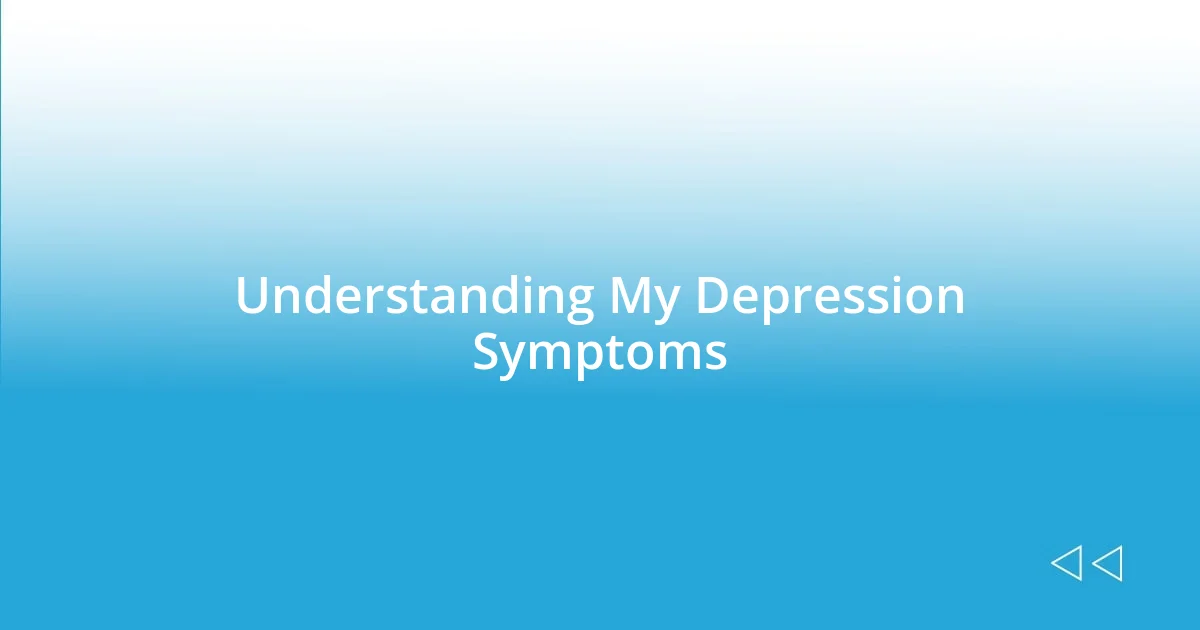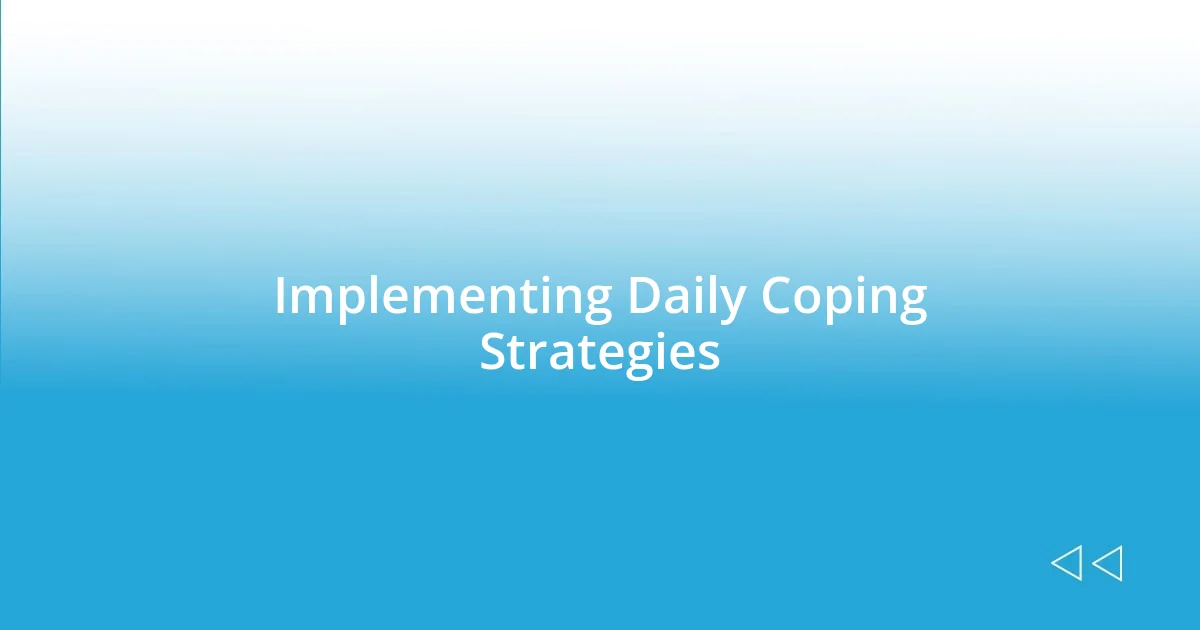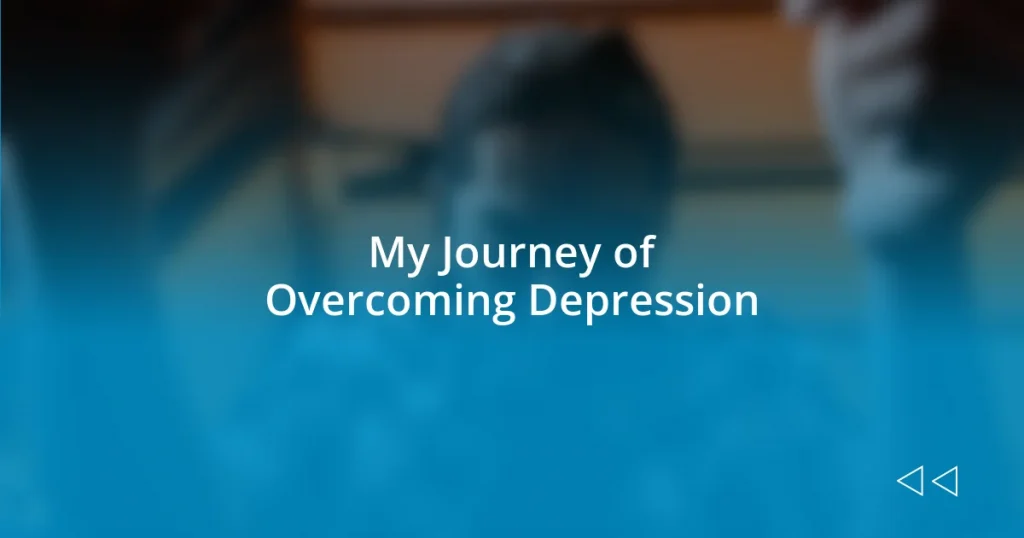Key takeaways:
- Understanding and recognizing depression symptoms, such as persistent sadness and isolation, is crucial for acknowledging the need for help.
- Finding the right support system, including friends, family, and professional help, significantly enhances the recovery process.
- Implementing daily coping strategies, tracking progress, and celebrating small victories help foster resilience and promote healing in managing depression.

Understanding My Depression Symptoms
Understanding my depression symptoms felt like navigating a foggy maze, where clarity was often out of reach. Some days, I’d wake up feeling like I was carrying a massive weight on my chest, making even the simplest tasks seem monumental. It’s curious—why is it that brushing my teeth felt more like climbing a mountain than a morning routine?
In my experience, the way depression manifests can vary immensely from person to person. My moments of intense sadness often came hand in hand with irritability; I remember easily snapping at loved ones over trivial things. Have you ever found yourself feeling frustrated with others, not because of them, but because of that inner turmoil? It’s a painful realization, enlightening yet disheartening.
Isolation was another symptom that crept into my life unnoticed. I began withdrawing from friends, preferring the silence of my room over social interactions. I used to wonder why I felt so disconnected, craving connection yet pushing people away. This tug-of-war within me was exhausting and often left me feeling trapped. Did you ever feel like the people around you were living in color while you were stuck in grayscale? Understanding these symptoms was the first step toward acknowledging my struggle.

Acknowledging the Need for Help
Acknowledging the need for help was a turning point in my journey. I remember a day when just getting out of bed felt insurmountable. That afternoon, gazing out the window, I realized I had been avoiding my friends’ calls for weeks. It struck me then—was I really okay, or was I just pretending? Recognizing that I needed assistance wasn’t easy. There’s a vulnerability in admitting this, but it also opened a doorway to hope and healing.
Understanding when to seek help can be difficult, but I learned a few signs to look for:
- Persistent feelings of sadness: When low moments linger or intensify, it’s a signal that something deeper might be at play.
- Loss of interest: Activities that once brought joy now feel dull or burdensome.
- Difficulty with daily tasks: If even the simplest chores feel overwhelming, it’s a red flag.
- Changes in sleep or appetite: Noticing drastic changes can indicate emotional distress.
- Isolation: Choosing to withdraw from friends and family can often be a sign of needing help.
Realizing I wasn’t alone in this struggle made all the difference. Acknowledging the need for assistance became my first step towards recovery.

Finding the Right Support System
Finding the right support system can feel like a lifeline when dealing with depression. I vividly recall the moment I sat down with a close friend who offered not just their ear, but also their heart. It wasn’t just about sharing my experiences; it was realizing that connection had the power to alleviate so much of the weight I carried. Have you ever felt lighter just by sharing what’s on your mind with someone you trust? Those moments can bring a sense of relief that’s hard to describe.
However, discovering the right kind of support is crucial. Through my journey, I encountered various types of support: friends, family, and professional help. Each played a distinct role. Friends often provided comfort and distraction, while family reminded me of love and connection. On the other hand, talking to a therapist offered a structured approach. It’s almost like piecing together a puzzle—different pieces can fit together uniquely to create a bigger picture of healing.
When I think about the importance of seeking the right support, I find it’s also about finding those who uplift and encourage growth. I remember a group therapy session where people shared their stories, and I felt an overwhelming sense of belonging. It reminded me that vulnerability can foster community. Have you ever been surprised by how many others quietly share your struggles? That realization transformed my perspective immensely.
| Type of Support | Pros |
|---|---|
| Friends | Accessible, provides companionship |
| Family | Emotional stability, long-term connection |
| Therapist | Structured guidance, professional insights |
| Support Groups | A sense of community, shared experiences |

Exploring Therapeutic Options Available
Therapeutic options available for managing depression range from traditional methods to holistic approaches, and finding what resonates with you is key. When I first explored therapy, I was hesitant. I remember flipping through countless options, and the thought of sitting across from a stranger felt daunting. Yet, realizing that there are various styles of therapy—like Cognitive Behavioral Therapy (CBT) or mindfulness practices—helped alleviate some of my fears. Have you ever considered how different approaches could work depending on your personality and needs?
Medication is another avenue I ultimately found necessary after much contemplation. Initially, I held reservations about taking antidepressants—they seemed so extreme at first. However, after discussing my feelings with my doctor, I realized that sometimes, the brain needs a little help in rebalancing. The difference was tangible. I often reflect on how finding the right medication transformed my daily life, making simple joys more accessible again. It’s remarkable what proper chemical balance can do for one’s mood, isn’t it?
Don’t overlook the power of lifestyle changes as therapeutic tools, either. For instance, I found that regular exercise had a surprising impact on my mental health. There were days when even getting up was a struggle, but committing to a simple walk around the block started a positive chain reaction. I gradually began to notice changes in my mood and energy levels. Have you experienced a moment when just a small change led to significant improvements? This ongoing exploration of various therapeutic options became an adventure in self-discovery—one that I continue to embrace with curiosity.

Implementing Daily Coping Strategies
In my journey, implementing daily coping strategies has been a game-changer. I still remember the morning I decided to start journaling my thoughts. At first, it felt strange to pour my feelings onto paper, but over time, it became a safe space for me to explore my emotions. Have you ever tried writing down what you’re feeling? There’s something empowering about seeing your thoughts laid out in front of you; it offers clarity and makes the chaos feel a bit more manageable.
Another strategy I embraced was the practice of mindfulness. I can vividly recall sitting in the quiet of my living room, focusing on my breath while anxiety tried to flood my mind. It was tough at first—my thoughts often wandered off, but with patience, I learned to anchor myself in the moment. I can definitely say that these mindful moments transformed my daily routine. Have you experienced that sense of calm when you truly tune into your surroundings? It brings a level of peace that I didn’t realize I was missing.
And let’s not forget about the importance of setting small, achievable goals. I remember days when just getting out of bed felt overwhelming, but I learned to celebrate small victories, like watering my plants or making a cup of tea. These tiny steps helped me feel more in control. Have you found success in establishing a routine, no matter how small? Reflecting on these little accomplishments consistently recharged my motivation, reminding me that progress doesn’t always have to be monumental to be valuable.

Tracking My Progress and Milestones
Tracking progress on my journey through depression has been an eye-opening experience. I created a simple chart that visually captured my emotional ups and downs over the weeks. Initially, seeing those fluctuations on paper was overwhelming, but then I noticed a pattern emerging. Have you ever tracked your moods? I found that understanding these patterns helped demystify those harder days, making them feel less isolating.
One of the most rewarding milestones was when I began to celebrate progress, no matter how small. For instance, I kept a jar where I’d drop in notes for each positive interaction or moment of clarity I experienced. The day I filled that jar to the brim felt like a personal victory—a tangible reminder of my resilience. Have you considered quantifying your achievements in a way that feels meaningful to you? Sometimes, those little acknowledgments can serve as powerful motivators.
I also made it a point to revisit my journal entries periodically. Reading back over my thoughts from tougher times offered profound insights into how far I had come. There were days when I could hardly make it through a sentence, yet I discovered a strength I didn’t know I had. Each reflection became a milestone marker on my path to healing. Isn’t it fascinating how self-reflection can illuminate growth? This simple act continues to fuel my commitment to progress, reminding me that every step counts.
















